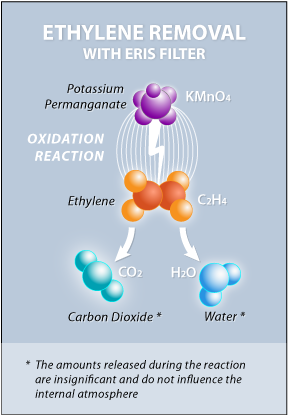About ethylene
The safe transportation of perishable products, whether fruits, vegetables or fresh cut flowers from the field to the consumer is tricky business. Post harvest handlers must do everything they can to maintain the best possible environmental conditions for those delicate parcels.
When considering the control of environmental conditions, don’t overlook the destructive power of ethylene gas – Mother Nature’s silent killer.

What is Ethylene Gas?
Ethylene gas (C2H4) is a natural growth hormone that is produced by plant tissue as well as by the combustion of synthetic materials. It is the only member of its class and has the simplest structure of all plant growth substances. Unlike most plant hormone compounds, ethylene is a gaseous hormone.
Ethylene is not harmful or toxic to humans; however, at extremely high concentrations it is combustible. Its impact on the post harvest industry is tremendous because it is active at very low concentrations and affects plants in many different ways.
Ethylene is involved in a plant’s growth process from seed germination to its eventual death and decay. During growth this is a necessary function of a healthy ecosystem, but death and decay of perishables in post harvest distribution areas means loss of viable product and large amounts of money.
Damaging effect
The most detrimental effects of ethylene are:
- Premature ripening
- Browning and yellowing
- Wilting
Ethylene producers
Most wounded plants give off ethylene gas. The gas evolves naturally from plant material that is rotting, ageing or ripening. Since a harvested plant is a wounded plant, that means most perishable distribution areas are virtual ethylene factories.
But plants are not the only producers of ethylene. It is produced when almost any material is incompletely combusted or burned. Some common external sources are trash burning, fluorescent lights, cigarette smoke and exhaust fumes. It also comes from certain fungi, like botrytis.
Pure automobile exhaust contains about 400 ppm of ethylene. So, urban, polluted inlet air could dramatically raise the concentration of ethylene in transport containers. Just a small amount of the gas, when added to a produce or floral load, can result in severe damage.

Cleaning as much ethylene out of the refrigerated container as possible is the best way to cut down on premature ageing and ripening and prolong the transportation life of fruits, vegetables and cut flowers. One of the simplest ways to remove ethylene from the atmosphere is to absorb and oxidize it with potassium permanganate. Eris filter works this way, which is why it is recommended as an essential and safe ethylene scrubber for transportation of perishables.
